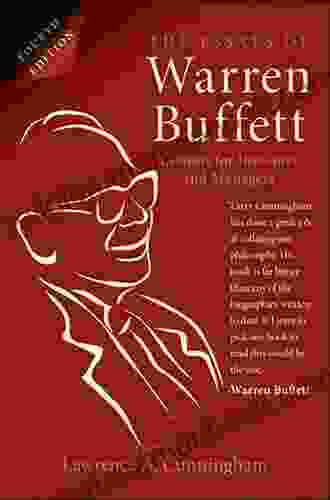The Essays of Warren Buffett: A Comprehensive Analysis and Practical Guide to Investing Success

Warren Buffett, widely regarded as one of the greatest investors of all time, has penned some of the most insightful and influential essays on investing. These essays provide a wealth of knowledge and wisdom, offering invaluable guidance to both aspiring and experienced investors. In this article, we will delve into the key themes and insights present in Buffett's essays, exploring their practical implications for investing success.
Buffett's investment philosophy is characterized by its emphasis on value investing. He believes in buying stocks of undervalued companies that have strong fundamentals, such as a solid financial position, competitive advantages, and a history of consistent earnings growth. Buffett favors companies with a long-term track record of success and a management team that is aligned with the interests of shareholders.
One of the key concepts in Buffett's philosophy is the "margin of safety." He advocates buying stocks at a significant discount to their intrinsic value, providing a buffer against potential losses and enhancing the likelihood of long-term gains. By purchasing companies at a discount, investors can limit their downside risk and increase their chances of achieving superior returns over time.
4.7 out of 5
| Language | : | English |
| File size | : | 4206 KB |
| Text-to-Speech | : | Enabled |
| Screen Reader | : | Supported |
| Enhanced typesetting | : | Enabled |
| Word Wise | : | Enabled |
| Print length | : | 345 pages |
Buffett emphasizes the importance of patience and discipline in investing. He believes that investors should avoid chasing after short-term gains and focus on long-term value creation. He advocates for investing in businesses that have a sustainable competitive advantage and a potential for compounded growth over many years.
Buffett advises investors to be patient and not to panic during market fluctuations. He believes that market downturns present opportunities for buying stocks at attractive prices. By remaining calm and disciplined during periods of volatility, investors can avoid making emotional decisions that can lead to poor investment outcomes.
Buffett places great importance on understanding the business fundamentals of any company he invests in. He analyzes factors such as a company's financial strength, management quality, competitive position, and long-term growth prospects. He seeks companies with strong competitive advantages, predictable earnings, and a sustainable moat that protects them from competition.
Buffett believes that it is essential to thoroughly research and evaluate a company before making an investment decision. He advises investors to study a company's financial statements, management team, and industry dynamics to gain a comprehensive understanding of its strengths, weaknesses, and future prospects.
One of the cornerstones of Buffett's investment strategy is the power of compounding. He believes that the long-term growth of investments is driven by the reinvestment of earnings and dividends. By reinvesting returns over time, investors can exponentially increase their wealth, even with modest annual returns.
Buffett encourages investors to invest for the long term and to let their investments compound over time. He believes that the compounding effect can turn even small initial investments into substantial sums over many years.
Buffett recognizes the significant role that psychology plays in investing. He believes that emotional biases and irrational behavior can lead to poor investment decisions. He advises investors to be aware of their own biases and to make rational decisions based on sound analysis, rather than fear or greed.
Buffett advocates for a calm and unemotional approach to investing. He encourages investors to avoid following the crowd and to make investment decisions based on thorough research and a clear understanding of the underlying businesses.
The insights and principles outlined in Warren Buffett's essays have profound implications for investing success. By understanding and applying these principles, investors can improve their investment outcomes and increase their chances of achieving financial goals.
Here are some specific practical implications of Buffett's investment philosophy:
- Focus on value investing: Invest in undervalued companies with strong fundamentals and a margin of safety.
- Be patient and disciplined: Avoid chasing short-term gains and focus on long-term value creation.
- Understand business fundamentals: Thoroughly research companies and invest in businesses with strong competitive advantages and sustainable growth prospects.
- Embrace the power of compounding: Reinvest earnings and dividends to exponentially increase wealth over time.
- Control emotions: Be aware of psychological biases and make rational investment decisions based on analysis, not fear or greed.
Warren Buffett's essays are a treasure trove of wisdom and insights for investors of all levels. By understanding and applying the principles outlined in these essays, investors can improve their investment outcomes and increase their chances of achieving financial success. Buffett's emphasis on value investing, patience, discipline, and rational decision-making has stood the test of time and remains an invaluable guide for investors seeking long-term wealth creation.
4.7 out of 5
| Language | : | English |
| File size | : | 4206 KB |
| Text-to-Speech | : | Enabled |
| Screen Reader | : | Supported |
| Enhanced typesetting | : | Enabled |
| Word Wise | : | Enabled |
| Print length | : | 345 pages |
Do you want to contribute by writing guest posts on this blog?
Please contact us and send us a resume of previous articles that you have written.
 Top Book
Top Book Novel
Novel Fiction
Fiction Nonfiction
Nonfiction Literature
Literature Paperback
Paperback Hardcover
Hardcover E-book
E-book Audiobook
Audiobook Bestseller
Bestseller Classic
Classic Mystery
Mystery Thriller
Thriller Romance
Romance Fantasy
Fantasy Science Fiction
Science Fiction Biography
Biography Memoir
Memoir Autobiography
Autobiography Poetry
Poetry Drama
Drama Historical Fiction
Historical Fiction Self-help
Self-help Young Adult
Young Adult Childrens Books
Childrens Books Graphic Novel
Graphic Novel Anthology
Anthology Series
Series Encyclopedia
Encyclopedia Reference
Reference Guidebook
Guidebook Textbook
Textbook Workbook
Workbook Journal
Journal Diary
Diary Manuscript
Manuscript Folio
Folio Pulp Fiction
Pulp Fiction Short Stories
Short Stories Fairy Tales
Fairy Tales Fables
Fables Mythology
Mythology Philosophy
Philosophy Religion
Religion Spirituality
Spirituality Essays
Essays Critique
Critique Commentary
Commentary Glossary
Glossary Bibliography
Bibliography Index
Index Table of Contents
Table of Contents Preface
Preface Introduction
Introduction Foreword
Foreword Afterword
Afterword Appendices
Appendices Annotations
Annotations Footnotes
Footnotes Epilogue
Epilogue Prologue
Prologue Maile Meloy
Maile Meloy John Updike
John Updike Ellie Curzon
Ellie Curzon Misha Shayter
Misha Shayter Stacey Matthews
Stacey Matthews David Lange
David Lange Barbara Calvert
Barbara Calvert Jean Marie Bauhaus
Jean Marie Bauhaus Elisient Maeve Vernon
Elisient Maeve Vernon Chris Scott
Chris Scott Jo Waters
Jo Waters Sir Max Hastings
Sir Max Hastings Charles Simic
Charles Simic Lene Fogelberg
Lene Fogelberg Cynthia J Cyrus
Cynthia J Cyrus Penina L Baltrusch
Penina L Baltrusch Aeschylus
Aeschylus Robert O Keohane
Robert O Keohane Zach Abraham
Zach Abraham Dr Faith G Harper
Dr Faith G Harper
Light bulbAdvertise smarter! Our strategic ad space ensures maximum exposure. Reserve your spot today!
 Lord ByronFollow ·17.8k
Lord ByronFollow ·17.8k Federico García LorcaFollow ·12.7k
Federico García LorcaFollow ·12.7k Elmer PowellFollow ·17.1k
Elmer PowellFollow ·17.1k Ronald SimmonsFollow ·14.9k
Ronald SimmonsFollow ·14.9k Emmett MitchellFollow ·13.9k
Emmett MitchellFollow ·13.9k Spencer PowellFollow ·2.9k
Spencer PowellFollow ·2.9k Chad PriceFollow ·17.3k
Chad PriceFollow ·17.3k DeShawn PowellFollow ·12.9k
DeShawn PowellFollow ·12.9k

 David Peterson
David PetersonUnveiling Eleven of the Wheel of Time: A Journey Through...
In the vast and intricate...

 Curtis Stewart
Curtis StewartEbony Jay Rice: A Rising Star in the Entertainment...
Ebony Jay Rice is a force to be reckoned...

 Matt Reed
Matt ReedNavigating Mental Health with Science: Overcoming...
Mental health is an integral part of...

 Guillermo Blair
Guillermo BlairFormer Magistrate's Poetic Reflections on Love and...
In the hallowed halls...

 Corey Green
Corey GreenOf the Dead: William Burroughs' Post-Beat Masterpiece
William S. Burroughs' Of the...
4.7 out of 5
| Language | : | English |
| File size | : | 4206 KB |
| Text-to-Speech | : | Enabled |
| Screen Reader | : | Supported |
| Enhanced typesetting | : | Enabled |
| Word Wise | : | Enabled |
| Print length | : | 345 pages |














